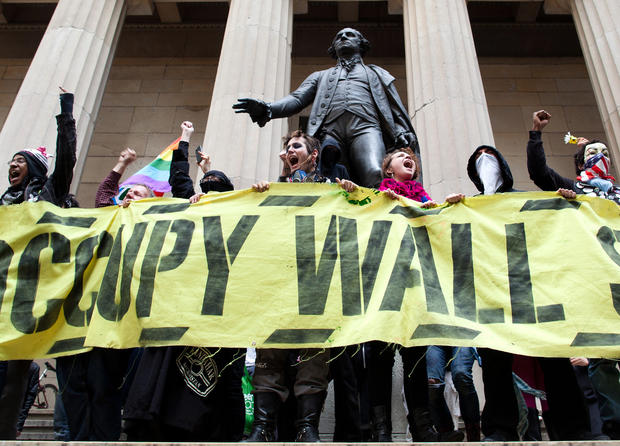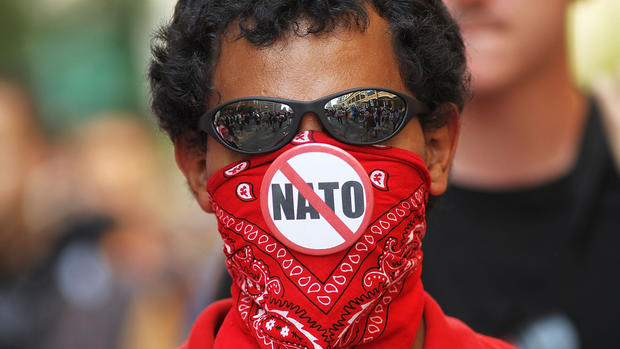Twitter ordered to hand over Occupy Wall Street protester's tweets
(AP) Twitter must give a court almost three months' worth of an Occupy Wall Street protester's tweets, a judge said in a ruling released Monday after the company fought prosecutors' demand for the messages.
Occupy Wall Street uses social media to spread nationwide
Manhattan Criminal Court Judge Matthew A. Sciarrino Jr. rebuffed one of Twitter Inc.'s central arguments, which concerned who has rights to contest law enforcement demands for content posted on its site. But the judge said the company was right on a separate point that that will make it tougher for prosecutors to get to see the final day's worth of Malcolm Harris' tweets and his user information.
Sciarrino also decided that he would review all the material he ordered turned over and would provide "relevant portions" to prosecutors.
The decision came in a case that began as one of hundreds of disorderly conduct prosecutions stemming from an Oct. 1 Occupy march on the Brooklyn Bridge, but it has evolved into a closely-watched legal tussle over law enforcement agencies' access to material posted on social networks.
The Manhattan district attorney's office said Harris' messages could show whether he was aware of police orders he's charged with disregarding. Twitter, meanwhile, said the case could put it in the unwanted position of having to fight for individual users' rights.
The DA's office said it was pleased with the ruling, which came after the judge turned down Harris' own request earlier this year to block prosecutors from subpoenaing his tweets and user information from Sept. 15 to Dec. 31.
"We look forward to Twitter's complying and to moving forward with the trial," Chief Assistant District Attorney Daniel R. Alonso said in a statement.
Twitter didn't immediately respond to a request for comment. Harris' lawyer, Martin Stolar, said he was studying the ruling Monday to determine how to respond.
Harris was among more than 700 people arrested in the Brooklyn Bridge march. Police said demonstrators ignored warnings to stay on a pedestrian path and went onto the roadway. Harris, an editor for an online culture magazine, and others say they thought they had police permission to go on the roadway.
He challenged the subpoena for his tweets, saying the timespan was unreasonably broad, and although the messages were sent publicly, seeking the accompanying user information violated his privacy and free association rights. The data could give prosecutors a picture of his followers, their interactions through replies and retweets, and his location at various points, Stolar said.
Prosecutors said the tweets might contradict Harris' claim that he thought police were allowing the protesters onto the roadway. And they said he couldn't claim his privacy rights should shield messages he sent very publicly, though some are no longer visible because newer ones crowded them out.
Sciarrino ruled in April that Harris didn't have a proprietary interest in his tweets and so couldn't challenge the subpoena, which was issued to Twitter.
Then San Francisco-based Twitter went to court on Harris' behalf, saying he had every right to fight the subpoena. Its user agreements say that users retain rights to content they post and can challenge demands for their records, and it would be "a new and overwhelming burden" for Twitter to have to champion such causes for them, the company argued in a court filing.
The judge said the company's argument didn't overcome his view that privacy protections don't apply to Harris' tweets.
"If you post a tweet, just like if you scream it out the window, there is no reasonable expectation of privacy," wrote the social-media-savvy Sciarrino, who laced his last ruling with the hashtag marks used to mark key words in tweets.
Twitter prevailed on another argument: that some of the tweets shouldn't be turned over because a federal law requires a court-approved search warrant, not just a subpoena issued by prosecutors, for stored electronic communications that are less than 180 days old.
Sciarrino found that law did apply - but only to Harris' tweets and information for Dec. 31, since the rest were more than 180 days old by the Saturday date of the ruling. It was released Monday.
Prosecutors' bid for the tweets had spurred concern among electronic privacy and civil liberties advocates, and some cheered Twitter's decision to take up the fight.
"This is a big deal," since authorities increasingly seek to mine social networks for information, American Civil Liberties Union staff attorney Adam Fine wrote in a post on the organization's site in May.
"It is so important to encourage those companies that we all increasingly rely on to do what they can to protect their customers' free speech and privacy rights," Fine.
Harris' case is set for trial in December.

